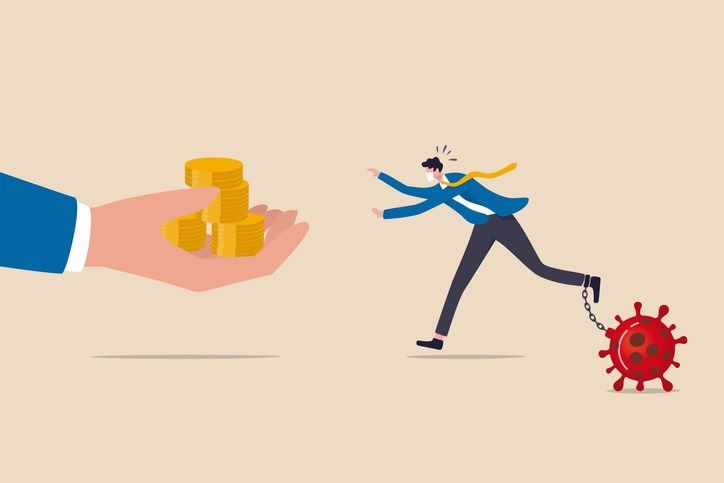How COVID-19 Impacted the Economy Blog

It comes as no surprise that SARS-CoV-2 has impacted the world economy and caused massive financial losses. Many safety measures and restrictions have been put in place that helps the world health, but, created extensive repercussions in the world economy. Citizens are no longer able to work in their workplaces and many stores and companies shut down. In one week 7,658 Canadians filed insolvencies in September reported The Office of the Superintendent of Bankruptcy Canada. This number has increased by almost 19 per cent from the previous month’s level and the highest in recent times. The economy is very different than it was half a century ago, so certain online businesses benefited during the pandemic such as Amazon and Netflix. Additionally, healthcare companies bloomed due to popular demand. However, many small businesses have gone bankrupt or reported severe lost revenue. With no foreseeable solution, SARS-CoV-2 presents a problem that will not only take more innocent lives but also wreak havoc in the economy if this remains unsolved.
As the virus continues to rampage and take lives, many businesses have turned their attention to online and virtual meetings. Softwares and apps like zoom, google meets and livestorm have massive sales and downloads for online meetings. Zoom reports that COVID-19 has made a 355% market income jump in the first quarter of the outbreak. The revenue has been about $188.1 million, compared to $2.3 million in the second quarter of 2020. However, online meetings are not enough to sustain the economy. More often, poor preparation, lack of agenda, and clear outcomes derail timely decisions and drain efficiency and productivity.

American Economy Growth of the past decade
https://www.weforum.org/agenda/2020/02/coronavirus-economic-effects-global-economy-trade-travel
Not only are businesses and companies but the economy, in general, has fallen. On January 19, 2020, the WHO reported a mysterious virus outbreak in Wuhan, China. Half a year later almost one trillion dollars have been lost in the efforts on stopping the virus. Countries are burning money to stop and control the virus but to no effect. $105.66 billion in federal payments to individuals have been reported by the CBC news. And almost $118.37 billion that has gone to businesses, non-profits and charitable organizations. A further $16.18 billion in transfers to provinces, territories, municipalities and government agencies in Ottowa alone. Monthly $2000 payments were offered to Canadians who were unable to work during the pandemic. But this is flawed as the unemployment rate has skyrocketed during this time.
This then brings the controversial argument: Health or the Economy. While health argues that a safe and healthy place helps protect citizens from injury and illness. It helps increase productivity and quality of work, raise morale and also lower injury/illness costs. It is in the best interest of some places to prioritize health and well being for the citizens for not only economic but also the health of B.C. But, the economy is still important. The economy is one of the most important aspects of building a strong nation. With a poor economy, not only does the main government not work but also causes problems for the citizens. With economic strain, citizens may experience loss of home property, horrible social relationships, medical problems, and involvement with the crime. Overall, this is an argument that still concerns the governments to this day.

For the past year, the American economy has been dragged down by the virus.
Alas, the virus is continuing to spread but the economy has been growing back at a rapid pace. It has been reported that the American economy has recovered back from the pre-SARS-CoV-2 days. Once the pandemic is over, the world economy shall recover. By distributing the vaccine in order to stop the spread of the virus, it will help the economy. But before that, governments could help donate to make smaller companies stay afloat in the time being. The world will finally be able to reintroduce better jobs and a stable economy.
References: Aaronson, Stephanie, and Francisca Alba. “The Unemployment Impacts of COVID-19: Lessons from the Great Recession.” Brookings, Brookings, 15 Apr. 2020, www.brookings.edu/blog/up-front/2020/04/15/the-unemployment-impacts-of-covid-19-lessons-from-the-great-recession/. Bartik, Alexander W., et al. “The Impact of COVID-19 on Small Business Outcomes and Expectations.” PNAS, National Academy of Sciences, 28 July 2020, www.pnas.org/content/117/30/17656. FitzGerald, Alan, et al. “An Instant Economic Crisis: How Deep and How Long?” McKinsey & Company, McKinsey & Company, 13 July 2020, www.mckinsey.com/business-functions/strategy-and-corporate-finance/our-insights/an-instant-economic-crisis-how-deep-and-how-long#. “The Global Economic Outlook During the COVID-19 Pandemic: A Changed World.” World Bank, www.worldbank.org/en/news/feature/2020/06/08/the-global-economic-outlook-during-the-covid-19-pandemic-a-changed-world#:~:text=Businesses might find it hard,by almost 8% in 2020. Written by Harry Kretchmer, Senior Writer. “How Coronavirus Has Hit Employment in G7 Economies.” World Economic Forum, www.weforum.org/agenda/2020/05/coronavirus-unemployment-jobs-work-impact-g7-pandemic/.